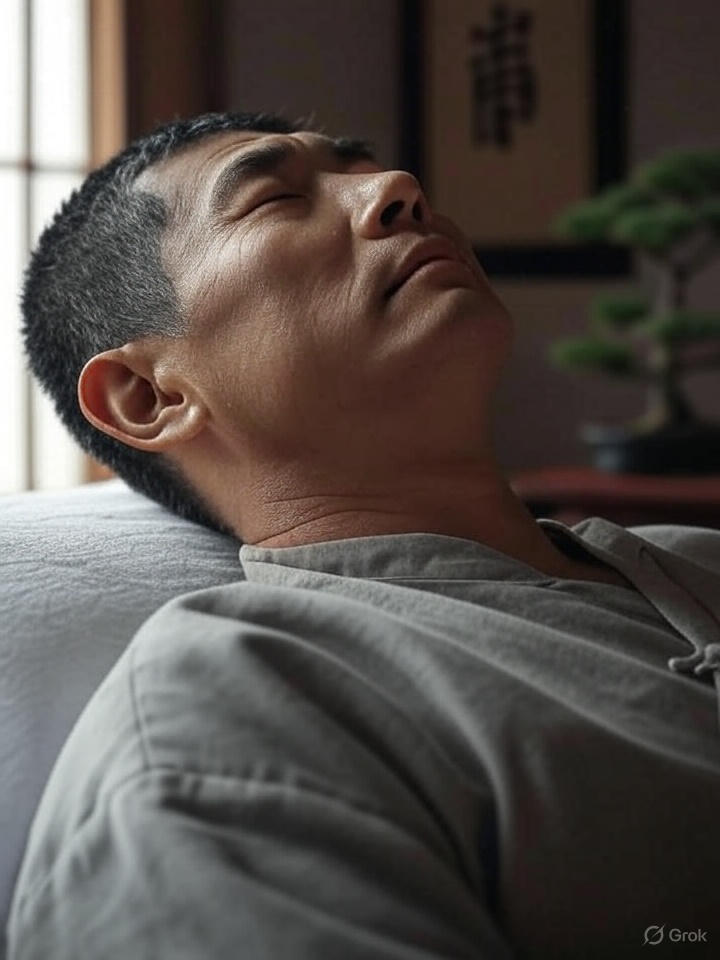Book Treatment Now

When the Body Remembers: Suppressed Grief & Auricular Acupuncture
When the Body Remembers: Queen Victoria’s Suppressed Grief & the Healing Power of Auricular Acupuncture
History and healing intertwine in the story of Queen Victoria, the “Widow of Windsor,” whose silent grief reflects a core principle of Traditional Chinese Medicine (TCM): suppressed emotions linger in the body. Auricular acupuncture, particularly through the NADA protocol, offers a gentle, evidence-informed way to release stored emotions and restore balance.
In this article:
-
Queen Victoria: The Weight of Unspoken Grief
-
TCM: Emotions and the Organ Systems
-
Ancestral Echoes: Carrying Emotions Across Generations
-
Auricular Acupuncture and the NADA Protocol
-
Expanded Benefits of Auricular Acupuncture
-
Why This Matters Today
-
Book Your Session in Cape Town
-
FAQ
-
References
Queen Victoria: The Weight of Unspoken Grief
 Following the death of Prince Albert in 1861, Queen Victoria entered a prolonged period of mourning, earning the moniker “the Queen who didn’t cry.” She suppressed public displays of grief while managing the demands of the British Empire, leading to chronic health issues such as rheumatism, digestive problems, shortness of breath, and weight gain. Victorian-era treatments often relied on rest, but a TCM perspective suggests her ailments stemmed from unexpressed grief stored in the body.
Following the death of Prince Albert in 1861, Queen Victoria entered a prolonged period of mourning, earning the moniker “the Queen who didn’t cry.” She suppressed public displays of grief while managing the demands of the British Empire, leading to chronic health issues such as rheumatism, digestive problems, shortness of breath, and weight gain. Victorian-era treatments often relied on rest, but a TCM perspective suggests her ailments stemmed from unexpressed grief stored in the body.
Key insight: Unprocessed emotions don’t disappear—they manifest physically, affecting breath, digestion, posture, and energy flow.
TCM: Emotions and the Organ Systems
Traditional Chinese Medicine (TCM) links specific emotions to organ systems, illustrating how emotional stagnation impacts physical health:
-
Lungs: Associated with grief and the ability to let go.
-
Liver: Tied to anger, frustration, and smooth energy flow.
-
Spleen/Stomach: Connected to worry and overthinking.
-
Kidneys: Linked to fear and foundational vitality.
-
Heart: Resonates with joy and, when imbalanced, heartbreak.
Chronic suppression of emotions can disrupt energy circulation, leading to symptoms like tension, pain, insomnia, or digestive issues. Queen Victoria’s physical struggles likely reflected her unvoiced sorrow, a phenomenon TCM has long recognised (Maciocia, 2005).
Ancestral Echoes: Carrying Emotions Across Generations
Many individuals feel they carry emotional patterns—grief, fear, or hypervigilance—not entirely their own, passed down through family narratives or nervous system imprints. Emerging research on epigenetics suggests that stress responses may be inherited across generations (Yehuda & Lehrner, 2018). TCM has long acknowledged such ancestral patterns, viewing them as imbalances that can be addressed. Auricular acupuncture helps rewire these inherited stress responses, fostering resilience and ease for both the individual and future generations.
Auricular Acupuncture and the NADA Protocol: Releasing Stored Emotions
Auriculotherapy, offered by practices like Spark of Life, targets specific ear points to regulate the nervous system and promote emotional balance. The NADA protocol, a standardised five-point ear acupuncture sequence, was originally developed for addiction recovery but has broader applications (Stuyt & Voyles, 2016). It is designed to:
-
Induce deep relaxation and emotional release
-
Reduce stress, anxiety, and cravings
-
Enhance sleep quality and digestion
-
Alleviate muscular tension and pain perception
-
Improve mood stability and mental clarity
Clients often report a profound sense of “letting go,” experiencing physical sensations like softened breathing, safe emotional release (e.g., tears), or a newfound lightness after sessions.
Expanded Benefits of Auricular Acupuncture
Auricular acupuncture offers a range of benefits, supported by clinical research and patient outcomes:
-
Nervous System Regulation: Activates the parasympathetic nervous system, reducing cortisol levels and promoting calm (Wang et al., 2012).
-
Pain Management: Decreases chronic pain by modulating pain pathways and reducing inflammation (Asher et al., 2010).
-
Mental Health Support: Alleviates symptoms of anxiety, depression, and PTSD, enhancing emotional resilience (Stuyt & Voyles, 2016).
-
Improved Sleep: Regulates circadian rhythms, helping with insomnia and restless sleep (Chen et al., 2007).
-
Digestive Health: Eases stress-related digestive issues by balancing the gut-brain axis (Li et al., 2014).
-
Holistic Emotional Processing: Facilitates safe release of suppressed emotions, reducing the physical burden of unexpressed feelings.
-
Enhanced Coping Mechanisms: Strengthens emotional boundaries and adaptive responses to stress, supporting long-term mental health.
These benefits make auricular acupuncture a versatile tool for addressing both physical and emotional imbalances, offering a non-invasive complement to other therapies.
Why This Matters Today
In modern life, many people, like Queen Victoria, are conditioned to “carry on” rather than process emotions fully. This can manifest as physical symptoms—tightness in the chest, fatigue, digestive unease, or chronic pain. Auricular acupuncture provides a body-first approach to complete the stress response cycle, restoring energy flow and emotional equilibrium in a compassionate, accessible way.
Book Your Session in Cape Town
✨ Begin your journey to release what your body holds.
Contact AcuDetox Cape Town or Spark of Life to schedule a session.
FAQ
Is auricular acupuncture safe?
When performed by trained practitioners using sterile, single-use needles, auricular acupuncture is widely regarded as safe. Most clients feel relaxed during and after sessions.
How many sessions are needed?
Individual needs vary. Many experience benefits within 3–6 sessions, while those addressing deep-seated or ancestral patterns may opt for a longer program.
Can auricular acupuncture complement other therapies?
Yes, it pairs well with talk therapy, breath work, meditation, or trauma-informed care, enhancing their effectiveness. Practitioners can customise treatment plans to suit your needs.
References
-
Asher, G. N., et al. (2010). Auriculotherapy for pain management: A systematic review and meta-analysis. Journal of Alternative and Complementary Medicine, 16(2), 109–117.
-
Chen, H. Y., et al. (2007). Auricular acupuncture treatment for insomnia: A systematic review. Journal of Alternative and Complementary Medicine, 13(6), 669–676.
-
Li, M. K., et al. (2014). Acupuncture for functional dyspepsia: A systematic review and meta-analysis. Evidence-Based Complementary and Alternative Medicine, 2014, 1–12.
-
Maciocia, G. (2005). The Foundations of Chinese Medicine: A Comprehensive Text. Elsevier Health Sciences.
-
Stuyt, E. B., & Voyles, C. A. (2016). The National Acupuncture Detoxification Association protocol, auricular acupuncture: A review of the literature. Journal of Addictions Nursing, 27(2), 87–92.
-
Wang, S. M., et al. (2012). Acupuncture and the relaxation response: Effects on the autonomic nervous system. Medical Acupuncture, 24(2), 102–108.
-
Yehuda, R., & Lehrner, A. (2018). Intergenerational transmission of trauma effects: Putative role of epigenetic mechanisms. World Psychiatry, 17(3), 243–257.




The intertwining of grief and healing in Queen Victoria’s life really resonates with the broader human experience, doesn’t it? Her profound mourning for Prince Albert illustrates how deeply personal loss can affect our emotional and physical well-being—a theme that remains relevant today. The way Queen Victoria’s grief was largely unacknowledged or silenced reflects how society often pressures individuals to carry their burdens silently, reinforcing the idea that emotions can remain lodged within us, manifesting in various ways as we navigate life.
Your exploration of Queen Victoria’s grief resonates deeply, especially in how it reflects the long-standing connection between emotions and physical well-being in Traditional Chinese Medicine. It’s fascinating how her experience exemplifies the idea that unexpressed emotions can manifest physically, reminding us of the importance of processing grief in our own lives.
Your exploration of Queen Victoria’s unexpressed grief resonates profoundly, particularly in our contemporary context where emotional suppression is often overlooked. Victoria’s prolonged mourning speaks to the powerful connection between our emotional experiences and physical well-being. It’s intriguing to consider how her public role might have shaped her ability to grieve openly, reflecting societal norms that still permeate our lives today.
The profound story of Queen Victoria and her suppressed grief resonated deeply with me, as it highlights the intricate relationship between our emotions and our physical health—a theme that is often overlooked in modern discussions about well-being. It’s fascinating to reflect on how historical figures like Victoria dealt with grief, especially in a society that placed a premium on stoicism and propriety. Her mourning period for Prince Albert wasn’t just a moment of public sorrow; it seems to have transformed into a lifelong struggle that had ramifications for her both personally and as a monarch.
This exploration of Queen Victoria’s grief and its connection to Traditional Chinese Medicine is both poignant and enlightening. It’s fascinating to consider how deeply suppressed emotions can inhabit our bodies and manifest in various ways. I can’t help but think about how today’s society often encourages us to maintain a brave face, much like Victoria did, even when we are grieving.
This post beautifully illuminates the connection between suppressed emotions and physical health, drawing a poignant parallel with Queen Victoria’s experience. It’s fascinating how the legacy of grief can extend beyond individual experience, potentially impacting future generations—something that TCM emphasizes with its views on ancestral echoes.
This exploration of Queen Victoria’s grief and its correlation with the principles of Traditional Chinese Medicine (TCM) is a profound reminder of how deeply emotions can imbed themselves in our physical and emotional selves. The historical context you present about her mourning period, following the untimely death of Prince Albert, resonates with many of us who have also navigated through periods of loss. It speaks to a larger truth: that grief is not merely a fleeting emotion but can become a defining aspect of our being, often influencing our health and well-being over time.